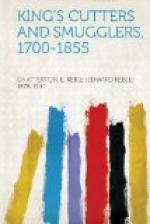Webber therefore obtained the assistance of a private in the 15th Regiment, and early in the evening, as he had been informed that the goods were not yet carried away, but still were lying deposited somewhere near the beach, proceeded to the spot. He and the hussar arrived at the place about nine o’clock on this June evening and managed to conceal themselves behind a hedge. They had not very long to wait before they heard the sound of some men talking, and a man named James Thomas was observed to remark:
“We couldn’t have had a better time for smuggling if we had lain abed and prayed for it.”
Through the openings in the hedge Webber and the hussar could see the outline of the delinquent, and the voice was more than familiar to the Riding officer. We can readily appreciate Thomas’s ecstasy when we remark that it had now become rather dark and a sea-haze such as frequently comes up in fine weather after a hot day was beginning to spread itself around. For some time longer the two men continued to remain in their hiding-place, and then heard that Thomas and his accomplice had become joined by a number of other people. The sound of horses’ hoofs being led down to the beach was also distinctly heard, and there were many signs of accelerated activity going on. Presently there came upon the ears of the Riding officers the noise which proceeds from the rattling of casks, and from some convenient hiding-place, where they had remained, these were at last brought forth, slings were prepared, and then the load was placed on the backs of the several horses.
At this point, deeming that the time had come to interfere, the Riding officer and the hussar crept out from their place of concealment and advanced towards the band of smugglers. But, alert as hares, the latter, so soon as they realised their own danger, took to their heels and ran helter-skelter away. Thomas, however, was too wrath to hasten, and began to curse his men. He began by complaining that the kegs which had been brought forth were wonderfully “slack,” that is to say they were not as full as they might have been, hinting that someone had been helping himself to their contents of spirits. “If you had brought these a little sooner,” referring doubtless to both horses and casks, “we should have been three miles on our way home.”
But scarcely had he finished his sentence than the last of his band had fled, leaving him behind with both horses and casks. He was promptly arrested and eleven months later prosecuted by the Attorney-General.
Because the smugglers were so frequently assisted in their work by those night signals to which we alluded some time back it had been made a penal offence to show a light for the purpose of signalling within six miles of the coast. Arising out of such an offence, John Newton and another found themselves prosecuted for an incident that occurred about the middle of December 1819. The comparative seclusion




